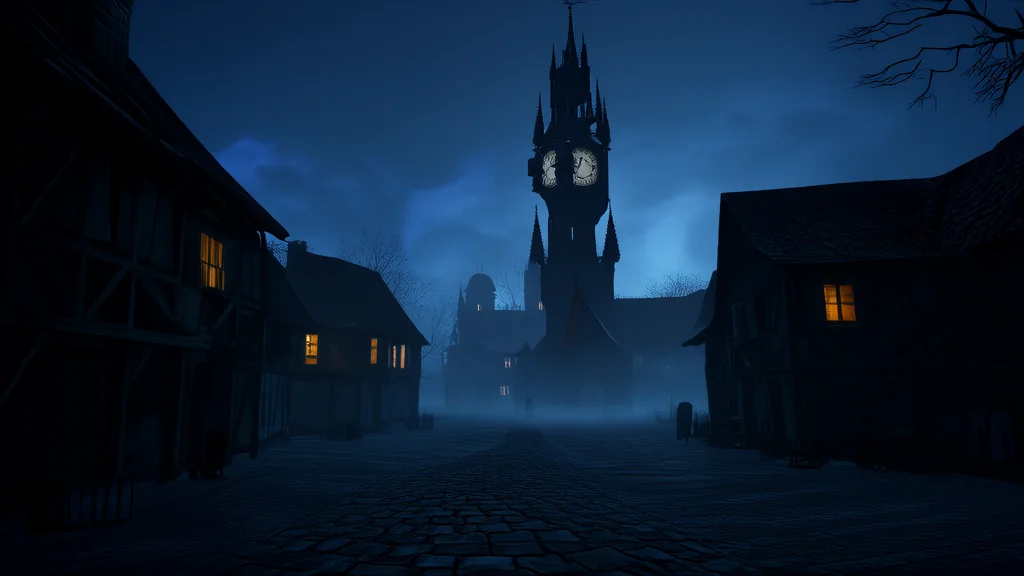🔮 Weird Tales & Urban Legends
The Silent Bell: When the Clock Never Ticks, But the Shadows Always Listen

Every evening at exactly 7:13 PM, the old clock tower in the center of the village would chime, but no one had ever seen the hands move. The villagers called it "The Silent Bell," and they avoided the square after dusk, whispering about strange shadows that flickered in the corners of their vision. No one could explain why the clock never ticked, yet the sound of its chime echoed through the town like a ghostly lullaby.
Lila had moved to the village three months ago, seeking solitude after her mother’s death. She found a small cottage on the edge of the woods, where the air always smelled faintly of damp earth and something sweet, like burnt sugar. She didn’t believe in superstitions, but she couldn’t ignore the way the wind seemed to hum when she walked past the clock tower. It wasn’t loud, just a low, mournful tune that made her spine tingle.
One night, as the sky turned the color of bruised fruit, Lila decided to investigate. She stood before the clock tower, its stone walls worn by time and weather. The door was locked, but the hinges creaked open when she touched them, as if expecting her. Inside, the air was colder than outside, and the walls were lined with dusty mirrors that reflected not just her face, but glimpses of people she didn’t recognize—women in long dresses, children playing in a field that wasn’t there.
At the top of the spiral staircase, she found a small room with a single window. Through it, she saw the village square below, but everything was frozen in time. The cobblestones were untouched, the lanterns still glowing, and the clock tower stood silent. Then, from the corner of her eye, she saw a figure standing near the fountain. It was a woman, her face pale and her eyes hollow. She raised a hand, pointing directly at Lila.
Lila stumbled back, heart pounding, and the room suddenly felt heavier, as if the air itself was pressing against her chest. When she turned around, the mirror behind her showed a different scene entirely—her own reflection staring back, but with a smile that didn’t match her lips. She ran down the stairs, slamming the door behind her, and the clock tower let out a deep, resonant chime that vibrated in her bones.
The next day, she asked the villagers about the tower. Most gave her uneasy looks and muttered about the curse. Only an old man named Elias spoke freely. He told her that the tower had once belonged to a reclusive clockmaker who disappeared decades ago. His wife, he said, had been seen wandering the square at 7:13 PM, searching for him. Some believed she had died of grief, others claimed she had never left.
Lila returned to the tower every night, determined to uncover the truth. She noticed that the chime only happened when the moon was full, and that the shadows in the square shifted in patterns too precise to be natural. One night, she caught a glimpse of the woman again, this time standing beside the fountain. This time, she approached her.
The woman turned, and for a moment, Lila saw her face clearly—a young woman with kind eyes and a soft smile. But as she opened her mouth to speak, her features twisted into something else, something wrong. Her skin darkened, her eyes turned black, and her voice came not from her mouth, but from the air itself.
"You shouldn't have come back," the voice whispered, echoing in Lila’s mind.
Before she could react, the woman vanished, and the clock tower began to shake. The mirrors in the room cracked, and the air filled with the sound of ticking—real, mechanical ticking. Lila ran, but the door was locked again, and the walls seemed to close in. The ticking grew louder, faster, until it was all she could hear.
When she finally escaped, the village square was empty. No one else had heard the chime that night. The next morning, Lila found a note in her cottage, written in a shaky hand: "It's not over. You're part of it now."
She tried to leave, but the road out of the village seemed to twist endlessly, leading her back to the same path. The villagers no longer looked at her, as if she had become invisible. And every night, at 7:13 PM, the clock tower chimed, and the woman appeared in the square, watching her.
Lila wondered if she had been the one who had disappeared all those years ago, or if she had simply taken the place of someone else. The line between past and present blurred, and the silence of the tower became a constant presence in her mind.
Was she trapped in a loop, or had she become part of the legend? As the moon rose higher, casting long shadows across the square, Lila realized the answer might not matter anymore. Because somewhere, in the quiet space between time and memory, the clock continued to tick, and the woman waited.
Published on en
🔗
Related Sites
- AI Blog — AI trends and tech news